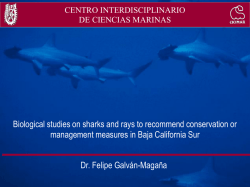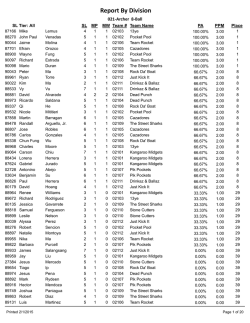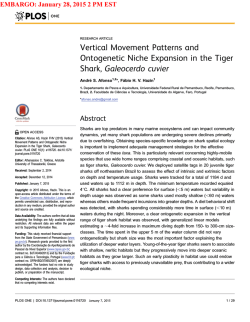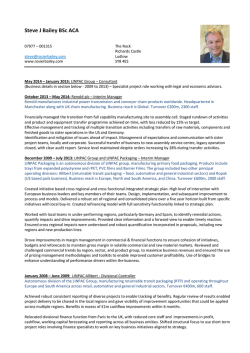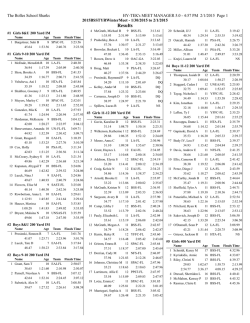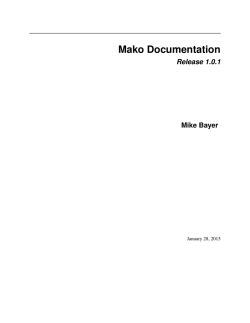
Panel 4 NGOs Position Statement
PA4-815/2015 POSITION STATEMENT FOR PANEL 4 24th Regular Meeting of the International Commission for the Conservation of Atlantic Tunas (ICCAT) Submitted on behalf of the following Non-Governmental Conservation Organizations: ________________________________________________________________________________________________ Sharks are among the most vulnerable animals taken in high seas fisheries for tuna and swordfish. ICCAT has led the world’s Regional Fishery Management Organizations in adoption of shark conservation measures, but has yet to agree basic, science-based limits for key shark species, or to align its finning ban with best practices. At the 2015 annual meeting, we urge ICCAT to: • establish caps on shortfin mako (Isurus oxyrinchus) and blue shark (Prionace glauca) catches; • prohibit the retention of porbeagle sharks (Lamna nasus); • require that sharks be landed with all fins still naturally attached; and • expand the Convention scope for enhanced elasmobranch conservation. ________________________________________________________________________________________________ Les requins figurent parmi les animaux les plus vulnérables capturés dans les pêcheries de thon et d’espadon en haute mer. La CICTA a encouragé les organisations régionales de gestion de la pêche du monde entier à adopter des mesures de protection des requins. Il lui reste cependant à fixer des limites de base fondées sur la recherche scientifique pour les principales espèces de requins concernées, ou à aligner son interdiction du finning sur les meilleures pratiques. Lors de sa réunion annuelle de 2015, nous demandons à la CICTA: • d’établir des plafonds pour les captures de requin-taupe bleu (Isurus oxyrinchus) et de requin bleue (Prionace glauca); • d’interdire la rétention du requin-taupe commun (Lamna nasus); • d’exiger que les requins soient débarqués avec toutes leurs nageoires encore naturellement attachées; • d’élargir le champ de la Convention pour améliorer la conservation des élasmobranches. ________________________________________________________________________________________________ Los tiburones figuran entre los animales más vulnerables capturados en las pesquerías de alta mar que se dedican a la pesca del atún y del pez espada. La CICAA ha liderado a las Organizaciones Regionales de Ordenación Pesquera en la adopción de medidas de protección para los tiburones, aunque aún tiene que acordar límites básicos y basados en las evidencias científicas para toda una serie de especies de tiburones clave, así como alinear con las mejores prácticas existentes su prohibición de corte de las aletas de tiburón, también conocido como “aleteo.” Instamos a la CICAA a que, en su reunión anual de 2015: • establezca topes para las capturas de marrajo (Isurus oxyrinchus) y tintorera (Prionace glauca); • prohíba la retención de marrajos sardineros (Lamna nasus); • exija que los tiburones sean desembarcados con las aletas adheridas de manera natural; y • amplíe el ámbito de aplicación de la Convención para otorgar una mayor protección a los elasmobranquios. Our organizations focus on conservation of sharks due to the low reproductive capacity that leaves these species exceptionally vulnerable to overexploitation. We are deeply concerned about the precarious status of pelagic sharks taken in ICCAT fisheries due to the lack of science-based fishing quotas, as well as poor compliance with existing limits and best practices. The reasons behind our requests for our specific ICCAT actions for sharks are outlined below. A Stronger Finning Ban We are very pleased by the growing number of countries proposing the best practice for shark finning ban enforcement (requiring that all sharks be landed with fins still naturally attached) at Regional Fishery Management Organizations (RFMOs) around the world. As detailed in the 2010 expert report from the European Elasmobranch Association and the Shark Specialist Group of the International Union for the Conservation of Nature (IUCN)1, under such a “fins-attached” policy: • Enforcement burden is greatly reduced; • Information on species and quantities of sharks landed is vastly improved; and • “High-grading” (mixing bodies and fins from different animals) is impossible. A ban on at-sea shark fin removal by ICCAT would underscore the strong precedent for other RFMOs set last year at the North East Atlantic Fisheries Commission (NEAFC), and would help to prevent this wasteful practice throughout the Atlantic Ocean. Blue Sharks We are disappointed that the latest stock assessment for heavily fished and increasingly retained blue sharks (Prionace glauca) remains uncertain, yet stress that uncertainty should not be used as an excuse for inaction. The precautionary approach, the Standing Committee for Research and Statistics (SCRS) recommendation that South Atlantic catches not increase, and the benefits of consistent action across the Convention Area together support an ICCAT limit that at least caps blue shark landings. Shortfin Mako Sharks We are deeply concerned about the lack of catch limits in place for the shortfin mako shark (Isurus oxyrinchus), one of the world’s most valuable and vulnerable pelagic sharks. According to the SCRS: • In ICCAT’s three Ecological Risk Assessments (ERAs) since 2008, the shortfin mako has ranked 2nd or 3rd among 16 pelagic elasmobranch species with respect to vulnerability to ICCAT fisheries. • Fishing mortality on shortfin mako sharks “should not be increased until more reliable stock assessment results are available for both the northern and southern stocks.” • “Precautionary management measures should be considered particularly for stocks where there is the greatest biological vulnerability and conservation concern, and for which there are very few data and/or great uncertainty in assessment results.” We recognize the pressing need for improved shortfin mako data with which to improve population assessments, and appreciate plans to do so over the next two years. In the meantime, however, biological vulnerability and status uncertainty in the face of high demand and fishing pressure continue to urgently warrant limits to at least cap mako landings. Given that ICCAT has taken stronger action for five shark species with lower ERA rankings, we see no valid excuse for continuing to leave mako sharks wholly unprotected from overfishing. Porbeagle Sharks We strongly support EU efforts to secure an ICCAT prohibition on retention, transshipment, storage, landing, and sale of porbeagle sharks (Lamna nasus), another exceptionally valuable and vulnerable shark species. We stress that the porbeagle, which ranks 4th in the latest ICCAT ERA, is among the most imperiled sharks taken in ICCAT fisheries: the IUCN has classified this species as Vulnerable globally, Endangered in the Northwest Atlantic, and Critically Endangered off Europe. 1 Fowler, S. and Séret, B. 2010. Shark fins in Europe: Implications for reforming the EU finning ban. European Elasmobranch Association and IUCN Shark Specialist Group.
© Copyright 2026
